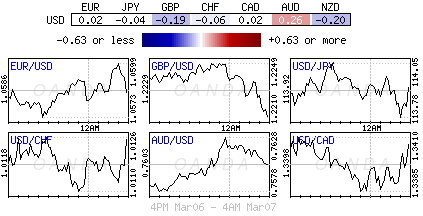Tuesday March 7: Five things the markets are talking about
Despite geopolitical tensions in Korea, lower 2017 growth target in China, and Trump’s wiretap accusations, the U.S reflation trade remains somewhat intact with 10-year Treasuries gaining +4bps yesterday, briefly touching an intraday high of +2.50% during the session. Even the mighty dollar has steadied against G10 currencies in early European trade.
There seem to be no more doubts about a rate hike from the Fed next week (Mar. 14-15). It’s the accompanying policy statement that equity investors should be most interested in, it will provide the market with more clues about the speed of subsequent futures rises.
Expect Friday’s non-farm payroll (NFP) to also play a big part in solidifying a hike next Wednesday. Anything close to expectations and its a slam-dunk for next Wednesday, a slip and money-market dealers will be second guessing themselves.
Note: Employers probably added around +190k workers to payrolls, in line with the average over the past six-months and a sign of steady job growth.
1. Stocks rally peters out
Investors betting that the global economy is strong enough to withstand an increase in borrowing costs have supported global indices to print record highs. However, the market now seems intent to seek a new catalyst to push equities any further.
In Japan, the Nikkei share average edged down (-0.2%) overnight with investors deterred mostly by geopolitical tensions after yesterday’s North Korean missile tests. The broader Topix traded flat.
In Hong Kong, stocks were firm on tech share strength and property rebound. The Hang Seng index rose +0.4%, while the China Enterprises Index gained +0.6%. In China, tech stocks also supported indices. The blue-chip CSI 300 index ended up +0.2%, while the Shanghai Composite Index gained +0.3%.
In Europe, equity indices are mixed. Financials are trading generally negative in the Eurostoxx, while commodity and mining stocks are supporting the FTSE 100.
U.S. stocks are set to open in the red (-0.2%).
Indices: Stoxx50 -0.1% at 3,385, FTSE +0.1% at 7,359, DAX +0.1% at 11,972, CAC 40 -0.3% at 4,959, IBEX 35 -0.2% at 9,782, FTSE MIB -0.2% at 19,407, SMI flat at 8,664, S&P 500 Futures -0.2%.
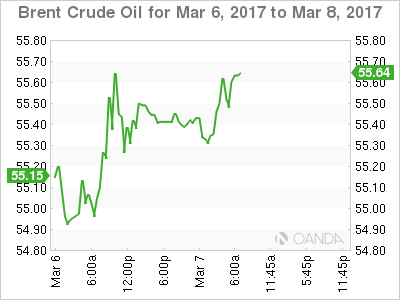
2. Oil prices hold steady, eyes on economic data
Oil prices are little changed overnight, with investors searching for direction as concern over rising U.S. shale output is being negated by OPEC’s production cuts.
Brent crude is down -9c, or -0.1% at +$55.92 a barrel, while West Texas Intermediate crude has fallen -6c, or -0.1% to +$53.14 a barrel.
Expect investors to take their cues from this week’s crude inventory reports and tomorrow’s import and export data from China.
Note: Russia and Iraq said yesterday that it was too early to discuss if the pact by OPEC and non-OPEC members should be extended beyond May.
Gold prices have edged lower (-0.1% to +$1,224.86) as the USD consolidates. The yellow metal is hovering above its two-week low print ($1,222.51) from last Friday amid signals of a hike in rates in the U.S. next week.
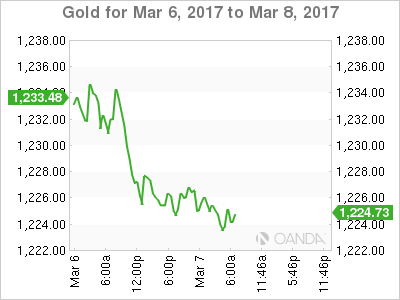
3. Expect wild swings in U.S. T-bills this month
Dealers are forewarning that this month’s U.S. T-bill market will be rather volatile as the outstanding stock of bills will fall by nearly -$100B between now and March 15, as the Treasury cuts its cash position in preparation for the mid-month debt ceiling reset. This will then be preceded by a surge in bill supply in the final two-weeks.
Yesterday’s T-bill auction showed a jump of +0.25% in yield in the 3-month tender (average yield +0.745%) as the market prices-in to discount next week’s rate hike. The 6-month tender was also up by +15.5bps (average yield +0.835%).
Elsewhere, the Reserve Bank of Australia (RBA) left its Cash Rate Target unchanged at +1.50% (as expected) and maintained its policy rhetoric that global economic conditions have “improved over recent months.” Governor Lowe reiterated that a rising AUD ($0.7593) could “complicate economic transition” and also expects Aussie headline inflation to pickup this year.
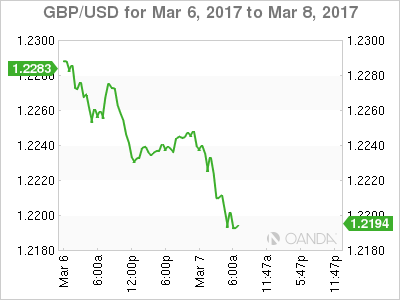
4. Sterling getting pounded
Ahead of the U.S open, the pound has fallen to its lowest level in more than seven-weeks against the USD and the EUR.
GBP/USD has dropped to £1.2198 and EUR/GBP has rallied to €0.8679 – the pounds weakest level since the third week of Jan. Whom to blame? Aside from Brexit fears, a British Retail Consortium (BRC) survey overnight showed that UK retail sales fell last month. This is raising concerns that the UK’s important consumer sector is cutting their spending in response to higher prices caused by a weak pound since the Brexit vote. Also hurting the pound is this morning’s Halifax data, which revealed weaker-than-forecast house price growth (+0.1% vs. +0.4%). Investors will now shift their focus to tomorrows UK budget.
Note: The UK’s House of Lords holds its final debate and vote on Article 50 Bill.
Elsewhere, data from the Czech central bank this morning showed that it intervened on a massive scale in January, by +€14.5B – far exceeding any previous amount since the central bank introduced a currency target (€27.016) four years ago.
Note: CZK central bank has signalled that it may discontinue the target around midyear is caused investors to pour into the CZK and hence the reason for intervention.
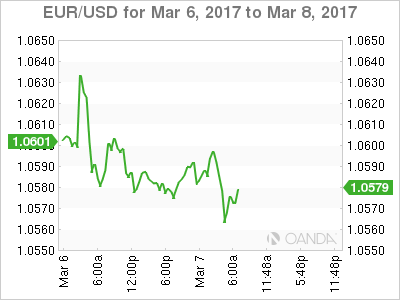
5. Eurozone growth unrevised
Eurostat has left its estimate for Q4 growth unrevised at +0.4% and +1.7% on the year.
Digging deeper, the breakdown showed the regions recovery has been kept on a steady path by a rebound in investment, and pick-ups in consumer and government spending. Trade was a drag, with imports rising at a faster pace than exports despite the EUR weakening in Q4.
The ECB should be happy to see a rise in investment, but expect Draghi to focus on inflation Thursday and potentially highlight that that consumer spending could be damped by rising inflation.
